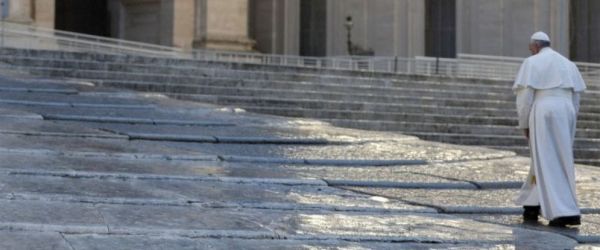This Sunday’s Gospel passage (cf. Jn 6:51-58) introduces us to the second part of the discourse that Jesus delivers in the Synagogue of Capernaum, after having satisfied the hunger of the great multitude with five loaves and two fish: the multiplication of the loaves. He presents himself as “the bread which came down from heaven”, the bread that gives eternal life, and he adds: “the bread which I shall give for the life of the world is my flesh” (v. 51).
This passage is decisive, and in fact it provokes the reaction of those who are listening, who begin to dispute among themselves: “How can this man give us his flesh to eat?” (v. 52). When the sign of the shared bread points to its true significance, namely, self-giving to the point of sacrifice, misunderstanding arises; it leads to the actual rejection of the One whom, shortly before, they had wanted to lift up in triumph. Let us remember that Jesus had to hide because they had wanted to make him king.
Jesus continues: “unless you eat the flesh of the Son of man and drink his blood, you have no life in you” (v. 53). Here the blood is present together with the flesh. In biblical language, flesh and blood express concrete humanity. The people and the disciples themselves sense that Jesus invites them to enter into communion with him, to ‘eat’ him, his humanity, in order to share with him the gift of life for the world. So much for triumphs and mirages of success! It is precisely the sacrifice of Jesus who gives himself for us.
This bread of life, the sacrament of the Body and Blood of Christ, comes to us freely given at the table of the Eucharist. Around the altar we find what spiritually feeds us and quenches our thirst today and for eternity. Each time we participate in the Holy Mass, in a certain sense, we anticipate heaven on earth, because from the Eucharistic sustenance, the Body and Blood of Jesus, we learn what eternal life is. It is living for the Lord: “he who eats me will live because of me” (v. 57), the Lord says. The Eucharist shapes us so that we live not only for ourselves but for the Lord and for our brothers and sisters. Life’s happiness and eternity depend on our ability to render fruitful the evangelical love we receive in the Eucharist.
As in that time, today too Jesus repeats to each of us: “unless you eat the flesh of the Son of man and drink his blood, you have no life in you” (v. 53). Brothers and sisters, it is not about material sustenance, but a living and life-giving bread, which conveys the very life of God. When we receive Communion we receive the very life of God. To have this life it is necessary to nourish ourselves of the Gospel and of the love of our brothers and sisters. Before Jesus’ invitation to nourish ourselves of his Body and of his Blood, we might feel the need to dispute and to resist, as did those listeners whom today’s Gospel spoke of. This happens when we struggle to model our existence after that of Jesus, to act according to his criteria and not according to worldly criteria. By nourishing ourselves of this food we can enter into full harmony with Christ, with his sentiments, with his behaviour. This is so important: to go to Mass and partake in Communion, because receiving Communion is receiving this living Christ, who transforms us within and prepares us for heaven.
May the Virgin Mary support our aim to enter into communion with Jesus Christ, by nourishing ourselves of his Eucharist, so as to become in our turn bread broken for our brothers and sisters.
[Pope Francis, Angelus 19 August 2018]












